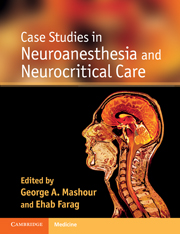Book contents
- Case Studies in Neuroanesthesia and Neurocritical Care
- Case Studies in Neuroanesthesia and Neurocritical Care
- Copyright page
- Contents
- Contributors
- Preface
- Section I Neuroanesthesia
- Section II Neurocritical care
- Case 74 Hypotension
- Case 75 Mechanicalventilation
- Case 76 Mechanicalventilation for acute lung injury in the neurosurgical patient
- Case 77 Change in mentalstatus
- Case 78 Therapeutic hypothermia using an endovascular approach in the neurocritical care patient
- Case 79 Therapeutichypothermia after cardiac arrest
- Case 80 Cerebralvasospasm
- Case 81 Ventriculoperitonealshunt dependence
- Case 82 Ventriculostomyinfection
- Case 83 Sodiumabnormalities in neurocritical care
- Case 84 Initial management
- Case 85 Increasedintracranial pressure at 48 hours poststroke
- Case 86 Hypertensiveintracerebral hemorrhage
- Case 87 Intracerebralhemorrhage and anticoagulation
- Case 88 Cerebralamyloid angiopathy-related intracranial hemorrhage
- Case 89 Traumaticbrain injury
- Case 90 Elevatedintracranial pressure
- Case 91 Succinylcholinein the patient with increased intracranial pressure
- Case 92 Pharmacologicmanagement of status epilepticus
- Case 93 Nonconvulsivestatus epilepticus
- Case 94 Rhabdomyolysis
- Case 95 Myastheniccrisis
- Case 96 Guillain-Barrésyndrome
- Case 97 Conductinga family meeting to decide withdrawal of care
- Case 98 Braindeath
- Index
Case 91 - Succinylcholinein the patient with increased intracranial pressure
from Section II - Neurocritical care
Published online by Cambridge University Press: 03 May 2011
- Case Studies in Neuroanesthesia and Neurocritical Care
- Case Studies in Neuroanesthesia and Neurocritical Care
- Copyright page
- Contents
- Contributors
- Preface
- Section I Neuroanesthesia
- Section II Neurocritical care
- Case 74 Hypotension
- Case 75 Mechanicalventilation
- Case 76 Mechanicalventilation for acute lung injury in the neurosurgical patient
- Case 77 Change in mentalstatus
- Case 78 Therapeutic hypothermia using an endovascular approach in the neurocritical care patient
- Case 79 Therapeutichypothermia after cardiac arrest
- Case 80 Cerebralvasospasm
- Case 81 Ventriculoperitonealshunt dependence
- Case 82 Ventriculostomyinfection
- Case 83 Sodiumabnormalities in neurocritical care
- Case 84 Initial management
- Case 85 Increasedintracranial pressure at 48 hours poststroke
- Case 86 Hypertensiveintracerebral hemorrhage
- Case 87 Intracerebralhemorrhage and anticoagulation
- Case 88 Cerebralamyloid angiopathy-related intracranial hemorrhage
- Case 89 Traumaticbrain injury
- Case 90 Elevatedintracranial pressure
- Case 91 Succinylcholinein the patient with increased intracranial pressure
- Case 92 Pharmacologicmanagement of status epilepticus
- Case 93 Nonconvulsivestatus epilepticus
- Case 94 Rhabdomyolysis
- Case 95 Myastheniccrisis
- Case 96 Guillain-Barrésyndrome
- Case 97 Conductinga family meeting to decide withdrawal of care
- Case 98 Braindeath
- Index
Summary
Keywords
- Type
- Chapter
- Information
- Case Studies in Neuroanesthesia and Neurocritical Care , pp. 309 - 310Publisher: Cambridge University PressPrint publication year: 2011

